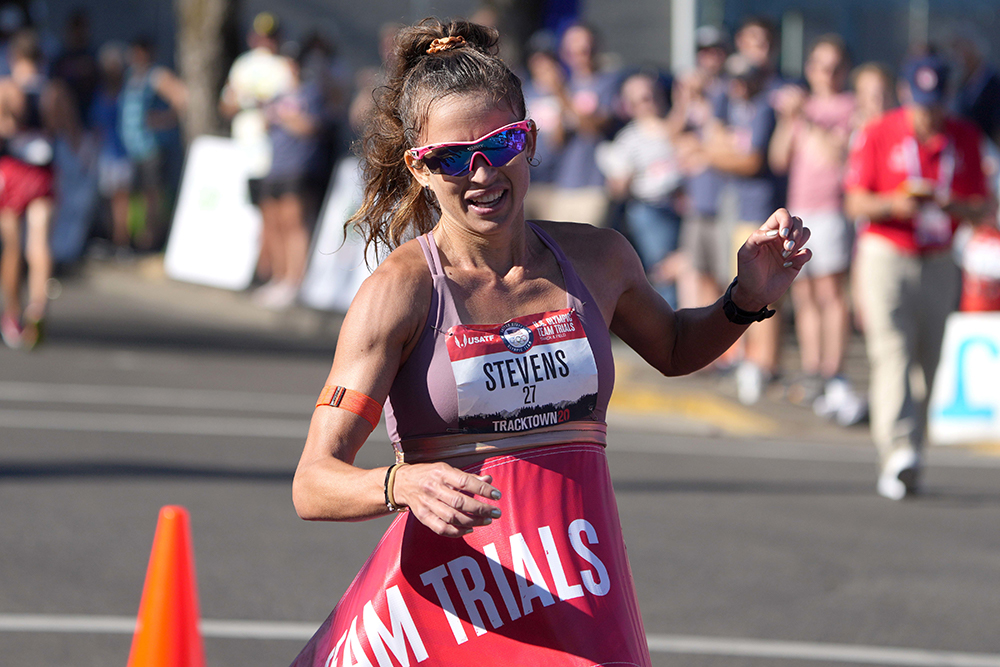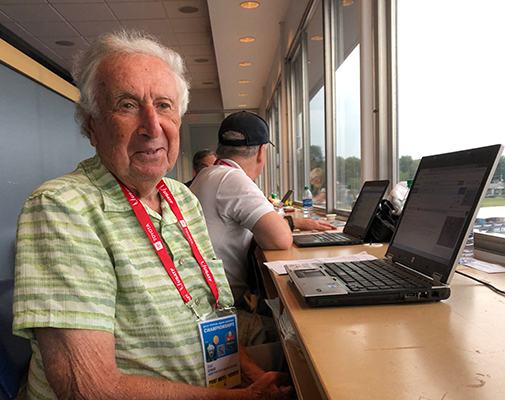
HAUPPAUGE, NEW YORK — After years and years of tough going, Team USA’s racewalking corps — a combination of veterans and young talent — is at last, at last beginning to see slivers of light at the end of its 20- and 35-kilometer tunnels.
Its numbers are minuscule to begin with — since American racewalking has no built-in farm system matching those in place for every other branch of track & field in the nation that proudly calls itself home to “the world’s number one team.”
But, small as it is, that corps has been cheered by recent developments.
Californian Nick Christie won the USATF 20K Championship here on Long Island last Sunday (April 24) in 1:24:36 just three weeks after he’d clocked a brilliant personal best of 1:22:44, placing 19th in the power-packed global field in the famed Podebrady, Czech Republic, event, leaving some very big names on the world scene to trail home in his slipstream.
Not since Tim Lewis blazed a 1:21:48 in 1986 and Tim Seaman went 1:22:02 in 2004 had Americans walked those 12.4 milers that quickly.
In the women’s division of that same Podebrady race, Robyn Stevens – who happens to be Nick Christie’s real-life partner as well as his training buddy — claimed a very solid 12th in 1:32:15, and again walked home ahead of numerous international elites.
Stevens next faced a semi-dilemma: Come to Long Island for the USA Nationals – the determinant of eligibility for the Eugene World Championships team, or return to the Czech Republic for last Saturday’s big 35K race in Dudince?
Well, she picked Dudince and followed through with a sizzling 2:49.29 clocking, good for (a) an American Record, (b) a very fine 5th place, (c) a spot well ahead of numerous top global talents, but (d) leaving her without a USA official Worlds qualifier by way of a place in a domestic National title event.
Dan Nehnevaj, too, is another American walker in “breakthrough” mode, thanks to his own solid 1:23:10 finish, just four spots back of Christie in Podebrady — and well ahead of many more global stars.
If he collects enough of those vital World Athletics rankings points in a Canadian 10K in early June, he has the potential to join Christie on the Worlds squad. And if he did get to compete in the Eugene 20K, he’d be an almost instant rooting interest.
Vancouver, Washington is his hometown, and that’s just north of Portland, which isn’t that long a hike from Eugene.
But he had to head East for his racewalking potential to blossom. A run-of-the-mill high school runner, he was invited to West Virginia Tech which, as an NAIA member gave him the potential to be a collegiate racewalker, a potential the NCAA precludes.
Nehnevaj placed 2nd to Christie at Hauppauge in 1:30:08, with Emmanuel “Nachos” Corvera 3rd at 1: 32:13 (after losing 2 minutes with a red-paddled invitation to the penalty box), John Cody Risch 4th at 1:32:18 and Jordan Crawford 5th in 1:33:11.
Just like Christie, Crawford has struck NAIA racewalking gold competing for Missouri Baptist College.
Sitting out the National 20K, however, with a slight tendon strain, was another bright young prospect – Cornell University sophomore Sam Allen who, still a teenager, had been the No. 1 USA 20K finisher in the early March World Team Championships in Muscat, Oman, just ahead of Crawford.
The vets ruled the women’s waves in the Hauppauge 20K.
Miranda Melville broke away from Maria Michta-Coffey early in the proceedings and was never overhauled, checking in at 1:36:01 to 8-time 20K champion Michta-Coffey’s 1:39:55. This was a feat 7 years in the making – MM had last beaten MMC for the national 20K crown in 2015.
Husband Joe Coffey barked encouragement to MMC throughout and their daughter Lili ‘s bright smile was further incentive. But Melville still ruled — by a decisive 3:54.
Stephanie Casey clocked in at 1:40:40, with Katie Burnett 1:41:50 and Celina Lepe 1:42:40 in 3-4-5.
Keep checking the tricky WA ranking tables, though, before you can identify the American women who’ll — hopefully — make it to the Worlds in Eugene.
It’s long been an uphill battle, but between its veterans and its younger talent, the rest of the world is beginning to notice.
“We’re welcomed now overseas,” said jet-setter Christie after his national 20K win. “People over there like to see American athletes. They’re used to seeing Americans doing well in everything else we try. We’re finally catching up in racewalking.”
Not since Curt Clausen’s bronze-medal 3:50:55 performance in the 50K at the ’99 World Championships in Seville has an American racewalker gone 1,2 or 3 at a major global event. And even then Curt never got to step onto a podium — the medal was awarded over 2 years later, after Russia’s German Skurgyin,– who was first over the line, was tossed on a drug violation.
Katie Burnett’s 4:21:51 4th place in the 50K at the London World Championships represented the best-ever finish by a U.S. woman in a global major.
Now, though, the 50K has been supplanted by the 35K on the World and Olympic calendars. And while the demise of the 50 — or 31.1 miles, the longest and toughest distance on the global calendar from 1932 through to 2021 — was decried by many, its replacement by the 35K may open more doors for speed-based “sprinter” types.
And Team USA has a bunch of them, the vets along with “the kids.”
A brilliant, logical and ticket-selling move by World Athletics would grant the home team a whole slew of “wild card” slots into every major championship meet it hosts— regardless of the points-table findings. But don’t really count on that ever happening. It’s too logical.
So American racewalkers will still have to push their progress to all kinds of new frontiers for the right to represent their nation on home turf in July.
With 2½ months to go, just call them definite maybes. ◻︎
